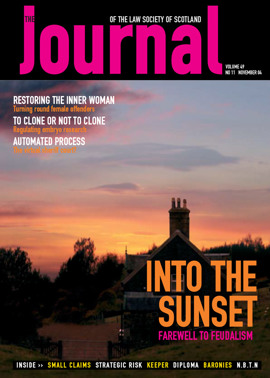What next for conveyancing?

Some Appointed Day musings
Donald B Reid, Mitchells Roberton
It is a relief, of a kind, to have reached the appointed day. I for one was getting confused by the very substantial amendments which the three Acts were introducing among each other. I cannot recall any new legislation which has been so altered before it even comes into force. So I hope we can now settle down as conveyancers and move from the uncertainty of what the legislation will be into the certainty, or at any rate reality, of what it means in practice. The Abolition Act has been a strange animal in that much of the activity it has generated has been in the run up to the appointed day, with notices of re-allotment and so on. Once the day arrives, and the Act comes into force, we will more easily be able to forget it. In its moment of birth, it dies.
The Title Conditions Act is the real tiger which the appointed day turns loose upon us. The quality of thinking and drafting which has gone into this colossal reform of our law, which I attribute largely to the Scottish Law Commission, has been of the very highest. But even so there are mysteries and ambiguities with this Act (witness the huge amounts of paper generated already in relation to sections 52 and 53) which will provide plenty of scope for litigation and expert pontificating over the next few years. It’s an ill wind...
My personal attention has been focused most of late on the last of the three Acts – The Tenements (Scotland) Act 2004. This commendable reform has in my view been hampered by “euro-proofing”, which has obliged it to retain the traditional, and in modern context inappropriate, common law rules that the top floor owns the roof and the ground floor the solum. The Act however overcomes this self-imposed shackling with its introduction of new provisions for maintenance and the Tenement Management Scheme. I am optimistic that these initiatives will prove to be a significant problem-solving resource. I am less hopeful about the last-minute amendments which introduced the notice of potential liability for costs. While I warmly commend the intensive lobbying which achieved a last-minute reconsideration by the Executive, I rather fear that what has been produced is a lemon, and will need further amendment at an early stage. I have already conducted two CPD seminars on the difficulties such notices will produce, and I feel an article coming on…
Will we leave it to the software?
Professor Robert Rennie, University of Glasgow and Harper Macleod
Many firms communicate only by email. Files are kept in the electronic system. The only things which are eventually committed to writing are missives and deeds themselves. It is clear that in a few years all conveyancing will be conducted or at least be capable of being conducted without subscribed paper, as we know it.
In some ways it is now odd to talk as if delivery of a deed had any legal consequences. The House of Lords appears to have confirmed the view that delivery of deeds does not transfer a property right (Burnett’s Trustee v Grainger [2004] UKHL 8). There is another question in relation to registration of title. On one view the act of registration is itself the act which creates ownership. In other words ownership, the real right, does not arise from the execution and delivery of a deed but purely on registration of an interest.
The words of section 3 of the Land Registration (Scotland) Act 1979 are that registration has the effect of vesting in the person entitled to the interest a real right in and to the interest. If ownership is derived from registration and no property right is ever acquired by mere delivery then the question arises as to whether or not delivery of a deed is actually necessary. This leads on to the question of whether a deed is necessary in land registration at all. If delivery is not required then do we need digital deeds at all? It is a question of effecting electronic transfer by means of a data package. In other words you simply tell the registers electronically that Joe and Agnes are now the proprietors and that their loan of £100,000 comes from HBOS.
One thing that is certain is that electronic conveyancing will be with us in a matter of a few years: I would say two to three years at the most depending on whether delegated legislation or primary legislation is the chosen route. Property lawyers have had to absorb a great many legislative changes in the past few years, far more than any of our predecessors would ever have contemplated. If one regards conveyancing as the body of law and practice which regulates the creation, transfer and discharge of rights by written deed, one wonders what will be left of pure conveyancing at the end of the day.
Perhaps we will all be property lawyers with a knowledge of the law of property and the law of registration, leaving the communication of rights to software.
Real people will still need real lawyers
Ross MacKay, Henderson Boyd Jackson
To a certain extent the challenges for tomorrow are really the same as the challenges of yesterday, only with bells and whistles on! By that I mean we have to continue to provide even greater levels of personal service at competitive costs; grapple with technicalities of legislation; comply with the regulatory demands of a modern professional framework; and continue to invest in IT to assist in and indeed reflect all the foregoing points. When we have done all that the final requirement is to leave the office on a Friday evening stress-free and with the jangle of a couple of coins in our pocket.
If there is one really serious challenge on the horizon it will be the advent of “Tesco” law or something similar. I remain cynical as to the benefits of such an approach to legal services as far as the consumer is concerned, but cynicism will be no defence to a serious financial onslaught by someone of that ilk. One has only to look at the profit margins of that type of player to realise what they could bring to the average conveyancing operation.
Grounds for optimism? I suppose at the end of the day no matter the demands of the consumer body, conveyancing never can be or will be as mechanistic a process as some would like it to be, and that will remain the case as long as there are real live people forming part of the equation. Did anyone see “I Robot” by the way?
Life after the Appointed Day
Professor Stewart Brymer, University of Dundee and Thorntons, WS; Convener, Conveyancing Committee
So the appointed day is almost upon us. At last, I hear many say. At least we can now get on and deal with the implications of the legislation. Its coming fully into force makes 28 November a day of major significance for conveyancers and property lawyers generally.
Much has been said and written already about the intricacies of the Title Conditions Act in particular and I am sure that there will be more to follow. Those of us who have been in practice for a number of years have most to learn and ignorance of the new law will certainly not be an excuse. We shall all have to hit the ground running.
This is the first step in the modernisation of our law of property. The next main challenge is the introduction of ARTL and a move towards full-blown e-conveyancing. Registers of Scotland have done a huge amount of work already on this exciting subject and, as a result, Scotland is, quite rightly, viewed as a leader in the field.
The next stage will be legislation to facilitate e-registration of a dealing with the whole of a registered interest. This should be with us within two years. What a fantastic opportunity this represents. Why should it not be possible to do a conveyancing transaction wholly online with all relevant information being available at the click of a mouse? Do we really need to exchange missives and have a disposition signed? Let’s consider and debate these, and other, important questions and develop our businesses accordingly. Contrary to the gloomy predictions of some, none of this represents a redundancy slip for conveyancers! Carpe diem.
In this issue
- Drafting consumer contracts
- Virtual firms: transactional learning on the web
- Ignorantia juris: it's all Greek to me
- Sheriff Court Rules Council consultation paper
- The Clinical Trials Directive - a summary
- Guarding the inner sanctum
- Neighbours in the global village
- Family law: is it the path for you?
- From sunset to sunrise
- What next for conveyancing?
- An ethical minefield
- Shredding the evidence
- Robbing the poor?
- Our dynamic profession
- A wider angle
- Keep the eye on the ball
- A rough guide to becoming a partner
- Rediscovering hope
- Sharpen your pencils
- Significant other
- Too far or not enough?
- Chipping away the infringers?
- View from Holyrood
- Website reviews
- Book reviews
- The Registers and the Appointed Day
- Feudal law: not just a relic
- Birth of a register






